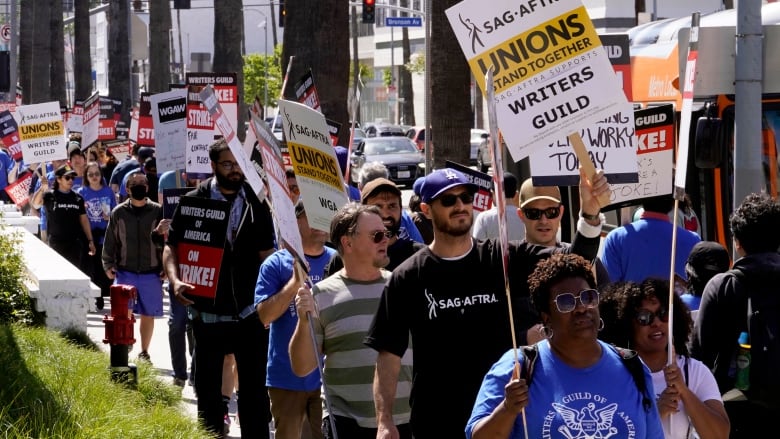Actors And Writers Strike: The Complete Impact On Hollywood

Table of Contents
Production Shutdowns and Delays
The strike brought almost all major film and television productions to a complete standstill. This includes studio productions, independent films, and network television shows, creating a massive backlog of projects. This widespread halt significantly impacts the entire production pipeline.
Impact on Film and Television Production
The sheer scale of the production shutdown is staggering. The ripple effect extends far beyond the immediate production teams.
- Hundreds of productions postponed indefinitely: Major tentpole films, popular TV series, and even smaller independent projects are all on hold, creating uncertainty for everyone involved.
- Significant financial losses for studios and production companies: The financial implications are monumental, with billions of dollars lost due to stalled productions and missed release dates.
- Delays in release dates for upcoming films and shows: Audiences are facing a drought of new content, with release dates pushed back indefinitely, impacting marketing schedules and audience anticipation.
- Backlog of projects upon the strike's resolution: Once the strike ends, the industry will face a massive backlog of projects, potentially leading to a surge in production activity and possibly even further strain on resources.
Impact on Post-Production
The impact isn't limited to production; post-production work is also heavily affected.
- Actors unable to participate in dubbing, ADR (Automated Dialogue Replacement), or promotional activities: The lack of actor involvement delays completion of already filmed projects.
- Delays in finishing already-filmed projects: Many projects nearing completion are stalled, awaiting the actors' return for crucial post-production tasks.
- Potential for further cost overruns: The extended delays add to the financial burden, with potential for even greater cost overruns as projects are put on hold.
Financial Implications and Economic Fallout
The financial ramifications of the actors and writers strike extend far beyond Hollywood's studios. The economic fallout impacts numerous related industries and communities.
Losses for Studios and Production Companies
The prolonged strike translates into billions of dollars in lost revenue.
- Decreased advertising revenue from lack of new content: The absence of new releases directly impacts advertising revenue for studios and networks.
- Stock prices impacted for entertainment companies: The uncertainty surrounding the strike has negatively impacted the stock prices of major entertainment companies.
- Losses for local economies reliant on film and television production: Many local economies heavily reliant on film and television production are experiencing significant job losses and decreased economic activity.
Impact on Crew and Supporting Industries
The strike has widespread consequences for the numerous workers and businesses that support the entertainment industry.
- Loss of income for supporting businesses such as catering, transportation, and equipment rental companies: These businesses, crucial to film and television production, face significant revenue losses.
- Increased unemployment in entertainment-related industries: Thousands of crew members, including camera operators, grips, and other support staff, are facing unemployment.
Key Issues Driving the Strike
The strike stems from fundamental disagreements over fair compensation, the role of AI, and the changing landscape of the entertainment industry.
Fair Compensation and Residuals
The central demand is for fair compensation, particularly residuals for streaming content.
- Streaming services generate significant profits but often pay minimal residuals to actors and writers: The traditional model of compensating actors and writers is insufficient in the streaming era.
- Demand for a fairer share of streaming revenue: The unions are seeking a more equitable share of the massive profits generated by streaming platforms.
- Negotiation of better contracts to protect actors and writers from exploitation: The goal is to establish contracts that prevent exploitation and ensure fair compensation for the work performed.
The Rise of AI in Entertainment
The increasing use of artificial intelligence in entertainment is a major point of contention.
- Fears of AI-generated scripts and performances replacing human talent: The unions are concerned about AI potentially replacing human actors and writers.
- Demand for regulations on the use of AI in creative content: They seek regulations to protect jobs and prevent the devaluation of human creativity.
- Need for clear guidelines to protect creative professionals' intellectual property: Protecting the intellectual property rights of actors and writers is a crucial aspect of the negotiations.
Potential Long-Term Effects on Hollywood
The actors and writers strike may bring about significant, long-term changes to Hollywood.
Shifting Landscape of Content Creation
The strike could accelerate pre-existing shifts in the entertainment industry.
- Increased use of independent production companies: The strike might lead to a rise in independent productions, bypassing major studios.
- Potential for more diverse voices and perspectives in storytelling: Independent productions often offer more diverse voices and perspectives.
- Possible exploration of alternative distribution models: The industry might explore new distribution models that are less reliant on traditional studios.
Changes in Labor Relations
The strike could fundamentally reshape labor relations in Hollywood.
- Increased union membership and participation: The strike may encourage greater union participation and strengthen collective bargaining power.
- Greater scrutiny of studio practices: The industry's practices will come under increased scrutiny.
- Potentially leading to long-term improvements in working conditions for actors and writers: The strike could result in improved working conditions and fair compensation for those in the entertainment industry.
Conclusion
The Actors and Writers strike is a pivotal moment in Hollywood history, with far-reaching consequences for the industry and the broader economy. The strike highlights crucial issues surrounding fair compensation, the impact of streaming services, and the rise of AI in creative work. While the full long-term impact remains to be seen, the strike has undoubtedly forced a necessary conversation about the future of the entertainment industry and the rights of those who create it. To stay updated on the latest developments in the actors and writers strike and its impact on Hollywood, continue to follow reputable news sources and industry publications. Understanding the intricacies of this Hollywood strike is crucial for everyone invested in the future of film and television.

Featured Posts
-
 Iims 2025 Jetour Luncurkan Tiga Warna Baru Untuk Dashing
Apr 28, 2025
Iims 2025 Jetour Luncurkan Tiga Warna Baru Untuk Dashing
Apr 28, 2025 -
 2000 Yankees Diary Recalling Posadas Key Home Run Vs The Royals
Apr 28, 2025
2000 Yankees Diary Recalling Posadas Key Home Run Vs The Royals
Apr 28, 2025 -
 Anchor Brewing Companys Closure A Legacy Concludes After 127 Years
Apr 28, 2025
Anchor Brewing Companys Closure A Legacy Concludes After 127 Years
Apr 28, 2025 -
 The Overseas Highway A Scenic Drive Through The Florida Keys
Apr 28, 2025
The Overseas Highway A Scenic Drive Through The Florida Keys
Apr 28, 2025 -
 Open Ai Unveils Streamlined Voice Assistant Development Tools
Apr 28, 2025
Open Ai Unveils Streamlined Voice Assistant Development Tools
Apr 28, 2025
